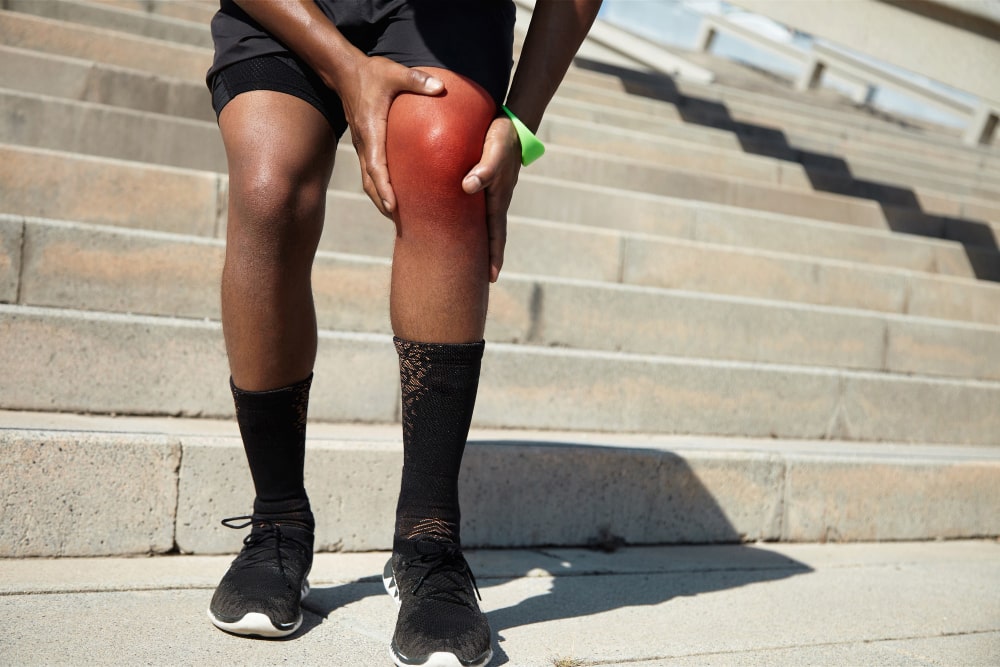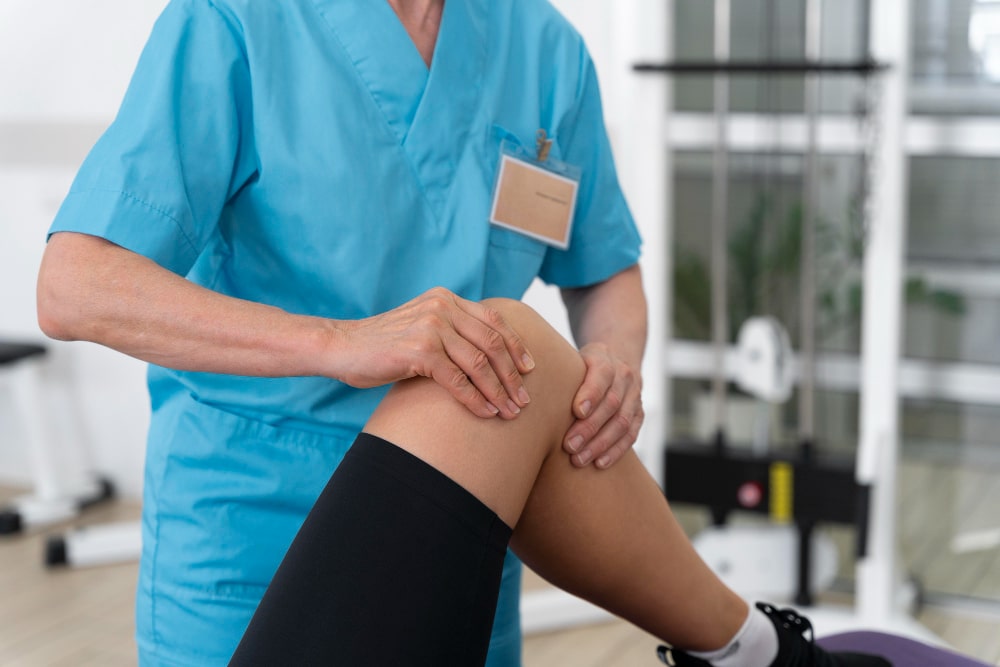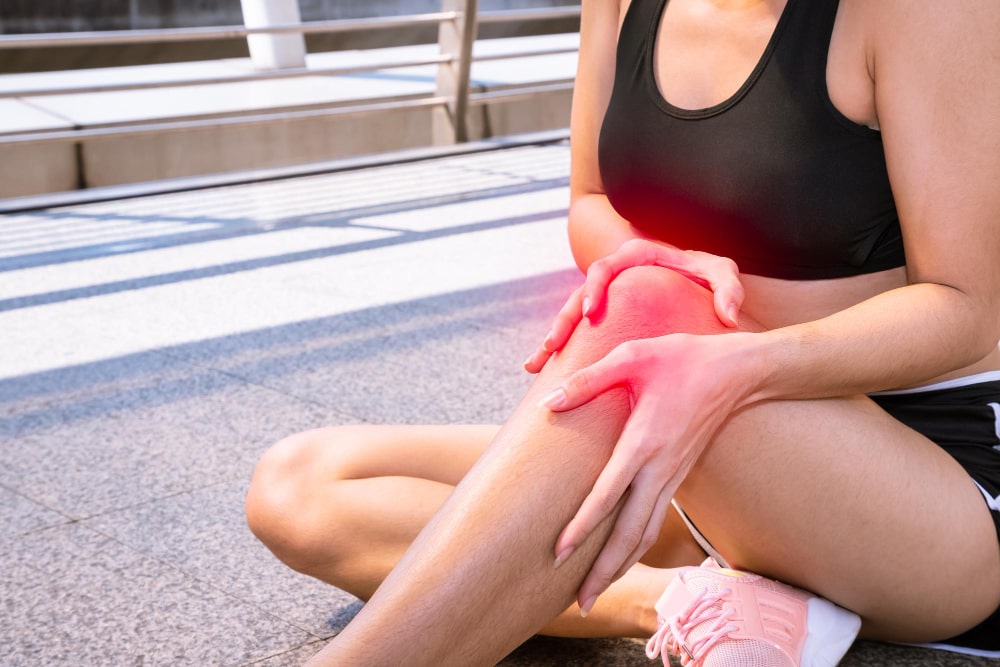If you’ve ever experienced a burning pain in your knee, you know it can make everyday activities difficult. This type of pain is common and can be caused by various conditions, from overuse injuries to arthritis. It’s important to understand the causes of burning knee pain so you can get the right treatment and relief. In this article, we’ll discuss the various causes of burning knee pain and provide tips on how to find relief. We’ll also share simple lifestyle changes you can make that may help reduce your symptoms. Read on to learn more about burning knee pain.
1. Understanding Burning Pain in Knee
Burning pain in the knee can be a common symptom of various conditions and injuries that affect your knee joint. It is often described as an intense or searing sensation and may be accompanied by swelling and tenderness around the area of discomfort. Some causes are related to underlying medical issues, while others are caused by repetitive strain or overuse.
The severity of burning pain in the knee can range from mild to severe and may even radiate down your leg. It is important to identify the underlying cause to receive the proper treatment for your condition.
Read More: Pain Behind Knee Hamstring: Causes, Symptoms, Treatment
Causes of Burning Knee Pain at night:
1. Injury – Common injuries to the knee, such as sprains and strains, can lead to burning pain in the joint. Other more serious injuries, such as ligament tears or fractures, can also cause discomfort in the knee area. If you’ve recently experienced an injury that could have affected your knee, it’s important to get it checked out by a doctor.
2. Overuse – If you participate in sports or activities that involve physical exertion, such as running or cycling, overuse of the knee can lead to burning sensations. This pain is usually caused by excessive strain on the joint and surrounding muscles.
3. Arthritis – Arthritis is a common cause of burning pain in the knee and other joints. Osteoarthritis is the most common form, which can cause by wear and tear on the joint due to age or injury. Rheumatoid arthritis is another type that can also lead to inflammation of the knee area and burning sensations.
4. Other Medical Conditions – burning sensation in knee can also be caused by other medical conditions, such as gout and bursitis. Gout is a type of arthritis that occurs when uric acid crystals build up in the joints. Bursitis is an inflammation of the small fluid-filled sacs that cushion your joints, resulting in a burning sensation.

Read More: Stomach Pain After Sex: Causes, Symptoms, and Remedies
3. Recognizing the Symptoms
In addition to burning pain in the knee, there are other symptoms you should look out for, such as:
– Burning Sensation: You may feel an intense or searing sensation around your knee joint, accompanied by swelling or tenderness.
– Swelling and Inflammation: Your knee may appear swollen or inflamed due to fluid accumulation in the affected area.
– Limited Range of Motion: You may find it difficult to bend your leg fully due to reduced flexibility in the affected area.
– Stiffness and Discomfort: You may experience stiffness or discomfort around your knee, making it difficult to perform daily activities.
– Difficulty Walking or Standing: You may find it hard to put pressure on your affected leg, making it difficult to walk or stand for long periods.
4. Diagnosis and Medical Evaluation
If you experience burning pain in your knee, it is important to seek medical attention to identify the underlying cause. Your doctor will perform a physical examination which may include the following:
Imaging Tests: X-rays or MRI scans can help to diagnose problems such as damage to the cartilage or ligaments.
Joint Fluid Analysis: Your doctor may take a sample of the fluid from your knee joint to check for signs of infection or inflammation.
Blood Tests: A blood test can help rule out any other underlying medical conditions that could be causing your burning sensation in knee.
Read More: Sharp Pain in Vagina: Causes, Symptoms, and Treatment
5. Treatment Options for Burning Pain in Knee
The treatment plan for burning pain in the knee will depend on its underlying cause. Options may include:
1) Rest
The most important part of treating burning knee pain is rest. This gives the joint time to heal and reduces the amount of strain being put on it. Avoid activities that involve running, jumping, or other physical exertion until your knee has healed completely.
2) Ice
Applying an ice pack to the affected area can help reduce inflammation and swelling, which can help alleviate the burning sensation. Make sure to wrap the ice pack in a towel before applying it, as direct contact with the skin can cause tissue damage.
Read More: Forearm Muscle Pain: What Causes It and How to Find Relief
3) Heat
Applying a heat source, such as a heating pad or hot water bottle, can help improve blood circulation and reduce stiffness in the joint. This can also promote healing and provide some relief from the burning sensation.
4) Medication
Anti-inflammatory medications, such as ibuprofen or naproxen, can help reduce pain and swelling associated with burning knee pain. However, it’s important to consult your doctor before taking any medication to ensure it’s appropriate for you.
5) Physical Therapy
A physical therapist can help you create an exercise plan that’s specifically tailored to your needs and condition. This can help strengthen the muscles around the knee joint, improve the range of motion, and reduce pain and inflammation.

6) Surgical Interventions:
In some cases, surgery may be recommended to repair damage or remove blockages in the knee joint.
Read More: Can Gallbladder Cause Back Pain: Causes, Symptoms, Cure
6. Lifestyle Changes and Home Remedies
In addition to medical treatment, there are several lifestyle changes and home remedies that can help reduce burning pain in the knee:
– Weight Management: Being overweight or obese can strain joints and increase pain. Losing weight can help to reduce pressure on the knee joint.
– Low-Impact Exercise: Activities such as swimming, cycling, and yoga are low-impact exercises that will not put excessive strain on your knee joint.
– Good Posture: Practicing good posture can help to reduce stress on the knees and improve flexibility in the joints.
– Protective Gear: Wearing protective gear such as a knee brace or wrap can provide extra support for your knee joint and reduce pain.
– Listen to Your Body: If you experience any pain in your knee, it is important to take a break and rest the affected area.
If you are experiencing burning sensation in knee that does not improve with home remedies or lifestyle changes, you should seek medical advice as soon as possible. Your doctor can help to identify the underlying cause and provide appropriate treatment for your condition.
How to Prevent Burning Knee Pain?
1. Strengthen Muscles
Exercising regularly and strengthening the muscles around your knee joint can help reduce the risk of injury and overuse, leading to burning pain. Make sure to stretch before and after any physical activity, as this helps improve the range of motion and reduce strain on the joint.
2. Wear Supportive Shoes
Wearing shoes with good support can help reduce strain on the knee joint and prevent overuse injuries. If you participate in sports, make sure to wear shoes specifically designed for the type of activity you’re doing.
3. Avoid High-Impact Activities
Excessive impact activities, such as running or jumping, can cause strain on the knee joint and lead to burning pain. If you engage in these activities, take regular breaks to rest your knee and avoid overuse.
Read More: Diarrhea While Breastfeeding: Causes, Remedies, Precautions
4. Wear Appropriate Gear
It’s important to wear the proper footwear and equipment when participating in physical activities. This can help support your joints and prevent injuries which could lead to burning sensation in knee.
5. Maintain Your Weight
Being overweight or obese can increase the strain on your knee joint. Maintaining a healthy weight through diet and exercise can help reduce that strain and prevent burning pain in the future.
6. Maintain a Healthy Weight
Carrying around extra weight puts more strain on your knees, leading to burning sensations. Losing weight, if needed, can help reduce the amount of pressure on your joints and reduce pain.
With the right treatment and lifestyle changes, burning pain in the knee can manage and reduced. If you are experiencing burning sensation in knee, it is important to seek medical advice as soon as possible to develop an appropriate treatment plan.
Read More: Back Pain When Breathing Deeply: Causes, Symptoms, Cure
Conclusion
In conclusion, burning pain in the knee is a common condition caused by various factors such as wear and tear of the cartilage or inflammation. It can manage with the right treatment plan, which may include rest, physical therapy, medications, and assistive devices. Additionally, lifestyle changes such as weight management and low-impact exercise can help to reduce stress on the affected joint and improve flexibility. If you are experiencing persistent burning sensation in knee, it is important to seek medical advice as soon as possible to receive the necessary diagnosis and treatment. With proper management, you can reduce your pain levels and resume normal activities.
FAQs
A: Resting your knee is the most important part of treating burning knee pain. Applying ice or heat to the affected area can also help reduce inflammation and swelling. Taking anti-inflammatory medications or engaging in physical therapy may also be beneficial.
A: It depends on the cause of your burning pain. If it is due to an injury or overuse, moving your knee may result in sharp or burning sensations. However, if the pain persists regardless of movement, you should consult a doctor as there may be another underlying cause.
A: The duration of burning knee pain depends on the underlying cause. If it is due to injury or overuse, rest and proper care should help reduce pain within a few days. However, if there is an underlying medical condition such as arthritis, the burning sensation may persist for much longer.
A: If your burning knee pain lasts over a few days despite rest and proper care, you should consult a doctor. They can help identify the underlying cause of your pain and provide treatment recommendations to alleviate it. Additionally, they may suggest lifestyle changes or physical therapy as part of the recovery process.
A: Burning sensation in knee can be a sign of an underlying medical condition, such as arthritis or gout, that requires treatment. If your pain persists despite rest and proper care, consulting a doctor is recommended to treat any underlying causes properly.

